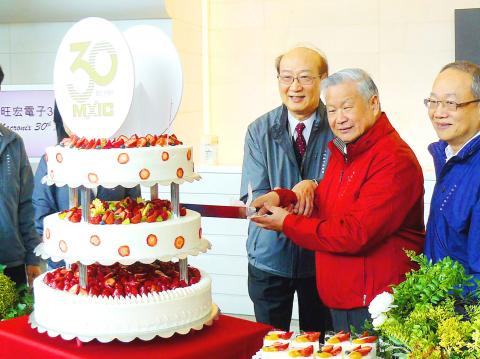Memorychip maker Macronix International Co (旺宏) yesterday said that it is shipping high-density memory chips for Huawei Technologies Co’s (華為) 5G base stations and expects client demand for the chips to peak next year or in 2021 in step with the global deployment of the next-generation wireless networks.
Other than Huawei, “80 percent of the [world’s] 5G companies are adopting our chips as well. Those [clients] are from China, Japan, Europe and South Korea,” Macronix chairman Miin Wu (吳敏求) told reporters at the company’s headquarters in Hsinchu.
“I believe the company is a major supplier to those [5G] clients,” he added.

Photo: CNA
As global telecom operators are just beginning to install base stations this year, shipments of Macronix’s memory chips used in 5G base stations are expected to peak next year, or the year after, Wu said.
He said that 5G base stations are expected to require a significant amount of memory chips, as they are usually equipped with high-density NOR flash with 1 or 2 gigabytes of memory.
Not only 5G technology, but also true wireless stereo earbuds are driving demand for memory chips and boosting memorychip prices, Wu said.
“Based on the information on hand, I think [prices] will grow mildly. The semiconductor looks quite good... There is room for price increases in the second half next year,” he said. “Demand for NOR flash and NAND flash memory chips should surpass supply sometime next year.”
Macronix expects demand to improve every quarter next year, he said.
Macronix, which turned 30 earlier this month, plans to ship its first 3D 48-layer NAND flash memory chips in the second half of next year, with the first batch going to Nintendo Co.
The chipmaker said that 3D 96-layer NAND flash memory chips would follow in 2021 and 192-layer chips in 2022.
To celebrate its 30th anniversary, Macronix is exhibiting innovative technologies and products — such as chips used in autonomous vehicles, automated external defibrillators, Fibit Inc’s smart watches, drones and Nintendo Co’s Switch game consoles — in a new showroom at its headquarters.
The company aims to grow its revenue from medical, industrial and automobile devices to make up 50 percent of the company’s revenue in the long term, compared with the current 25 percent, Wu said.
Macronix invests 15 percent of its annual revenue in research and development (R&D) and had 7,950 patents granted as of October, the company said, adding that about 20 percent of its 40,000 employees are R&D staff.
Macronix said that it would give a NT$10,000 (US$328) bonus to each employee to celebrate its anniversary.
In other words, it would pay a total of NT$40 million in bonuses, which Wu said reflected the company’s gratitude for the contribution made by its employees and support from their families.
The company reported earnings per share of NT$4.94 for last year and NT$1.21 per share for the first three quarters of this year.
Revenue for last month decreased 6 percent to NT$3.66 billion, from NT$3.89 billion a year earlier. In the first 11 months, cumulative revenue totaled NT$29.08 billion, 9 percent less than the NT$31.87 billion reported for the same period last year.
Additional reporting by CNA

Sweeping policy changes under US Secretary of Health and Human Services Robert F. Kennedy Jr are having a chilling effect on vaccine makers as anti-vaccine rhetoric has turned into concrete changes in inoculation schedules and recommendations, investors and executives said. The administration of US President Donald Trump has in the past year upended vaccine recommendations, with the country last month ending its longstanding guidance that all children receive inoculations against flu, hepatitis A and other diseases. The unprecedented changes have led to diminished vaccine usage, hurt the investment case for some biotechs, and created a drag that would likely dent revenues and

Global semiconductor stocks advanced yesterday, as comments by Nvidia Corp chief executive officer Jensen Huang (黃仁勳) at Davos, Switzerland, helped reinforce investor enthusiasm for artificial intelligence (AI). Samsung Electronics Co gained as much as 5 percent to an all-time high, helping drive South Korea’s benchmark KOSPI above 5,000 for the first time. That came after the Philadelphia Semiconductor Index rose more than 3 percent to a fresh record on Wednesday, with a boost from Nvidia. The gains came amid broad risk-on trade after US President Donald Trump withdrew his threat of tariffs on some European nations over backing for Greenland. Huang further

CULPRITS: Factors that affected the slip included falling global crude oil prices, wait-and-see consumer attitudes due to US tariffs and a different Lunar New Year holiday schedule Taiwan’s retail sales ended a nine-year growth streak last year, slipping 0.2 percent from a year earlier as uncertainty over US tariff policies affected demand for durable goods, data released on Friday by the Ministry of Economic Affairs showed. Last year’s retail sales totaled NT$4.84 trillion (US$153.27 billion), down about NT$9.5 billion, or 0.2 percent, from 2024. Despite the decline, the figure was still the second-highest annual sales total on record. Ministry statistics department deputy head Chen Yu-fang (陳玉芳) said sales of cars, motorcycles and related products, which accounted for 17.4 percent of total retail rales last year, fell NT$68.1 billion, or

MediaTek Inc (聯發科) shares yesterday notched their best two-day rally on record, as investors flock to the Taiwanese chip designer on excitement over its tie-up with Google. The Taipei-listed stock jumped 8.59 percent, capping a two-session surge of 19 percent and closing at a fresh all-time high of NT$1,770. That extended a two-month rally on growing awareness of MediaTek’s work on Google’s tensor processing units (TPUs), which are chips used in artificial intelligence (AI) applications. It also highlights how fund managers faced with single-stock limits on their holding of market titan Taiwan Semiconductor Manufacturing Co (TSMC, 台積電) are diversifying into other AI-related firms.